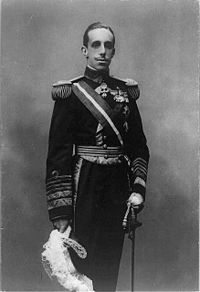Alfonso XIII of Spain
From Wikipedia, the free encyclopedia.
|
||||||||||||||||||||||||||||||||||||||||||||
Alfonso XIII of Spain (May 17, 1886 – February 28, 1941), King of Spain, posthumous son of Alfonso XII of Spain, was proclaimed King at his birth. He reigned from 1886-1931. His mother, Queen Maria Christina of Austria, was appointed regent during his minority. In 1902, on attaining his 16th year, the King assumed control of the government.
On May 31, 1906 he married Scottish-born Princess Victoria Eugenie of Battenberg (1887-1969), a niece of King Edward VII of the United Kingdom and a granddaughter of Queen Victoria of the United Kingdom. A Serene Highness by birth, Ena, as she was known, was raised to Royal Highness status a month before her wedding to prevent the union from being viewed as unequal. As Alfonso XIII and Queen Ena were returning from the wedding they narrowly escaped assassination in a bomb explosion, which killed and injured many bystanders and members of the royal procession.
The royal couple had seven children:
- Infante Alfonso Pio Cristino Eduardo, Prince of the Asturias (1907-1938), a hemophiliac, he renounced his rights to the throne in 1936 to marry a commoner, Edelmira Sampedro Ocejo y Robato, and became Count of Covadonga. He later remarried to Marta Esther Rocafort y Altazarra, but had no issue by either of them.
- Infante Jaime Luitpold Isabelino Enrique (1908-1975), a deaf-mute as the result of a childhood operation, he renounced his rights to the throne in 1933 and became Duke of Segovia, and later Duke of Madrid, and who, as a legitimist pretender to the French throne from 1941 to 1975, was known as the Duke of Anjou.
- Infanta Beatriz Isabel Federica Alfonsa Eugenia (1909-2002), who married Don Alessandro Torlonia, 5th Prince di Civitella-Cesi.
- Infante Fernando, stillborn (1910)
- Infanta Maria Cristina Teresa Alejandra (1911-1996), who married Enrico Eugenio Marone-Cinzano, 1st Conte di Marone.
- Infante Juan Carlos Teresa Silvestre Alfonso (1913-1993), named heir to the throne and Count of Barcelona.
- Infante Gonzalo Manuel Maria Bernardo (1914-1934), a hemophiliac.
The king also had three illegitimate children, Roger Leveque de Vilmorin (1905-1980), by French aristocrat Mélanie de Gaufridy de Dortan; Leandro Alfonso Ruiz Moragas (born in 1929), officially recognized by Spanish courts on May 21, 2003 as Leandro Alfonso de Borbón Ruiz, son of the King; and his sister Ana María Teresa Ruiz Moragas. The mother of both siblings was the Spanish actress Carmen Ruiz Moragas.
During his reign Spain lost its last colonies in Cuba, Puerto Rico and the Philippines, lost several wars in north Africa, and endured the dictatorship of Miguel Primo de Rivera. When the Second Spanish Republic was proclaimed on April 14, 1931, he abandoned the country with no formal abdication. When the Spanish Civil War broke out, Alfonso made it clear he favoured the military uprising against the Popular Front government, but General Francisco Franco in September 1936 declared that the Nationalists would never accept Alfonso as king. He went first exile to France. Later he moved to Italy, and died in Rome in 1941. After leaving his successory rights to his fourth, but second surviving, son Juan de Borbon, Count of Barcelona, the father of the later King Juan Carlos. The count of Barcelona renounced his rights to the throne in 1977, in favor of his son, Juan Carlos.
| Preceded by: Alfonso XII |
King of Spain 1886-1931 |
Succeeded by: Monarchy abolished; Second Spanish Republic declared |
| Spanish Head of State 1886-1931 |
Succeeded by: Niceto Alcalá-Zamora |
|
| Preceded by: Monarchy abolished; Second Spanish Republic declared |
Titular King of Spain 1931-1941 |
Succeeded by: Juan III (Count of Barcelona) |




